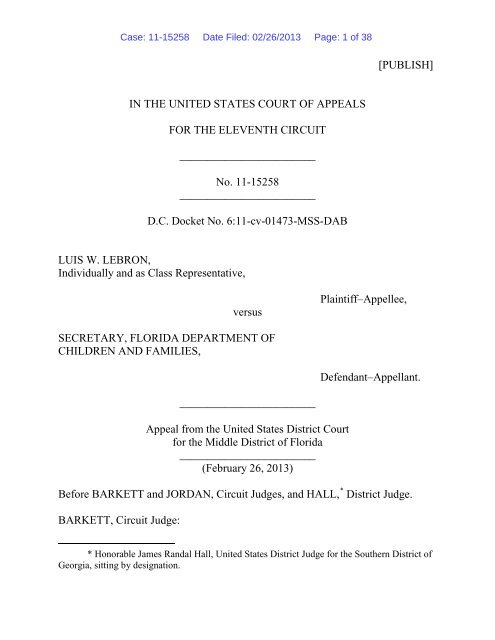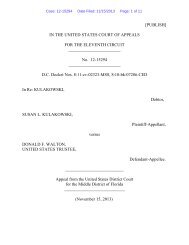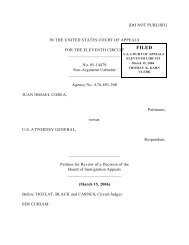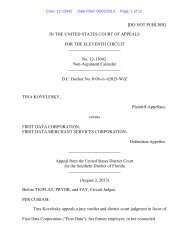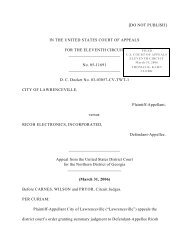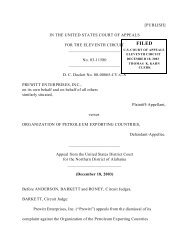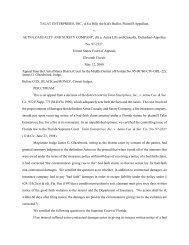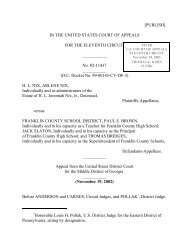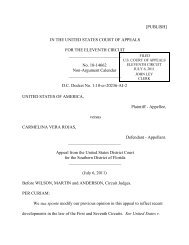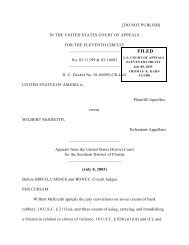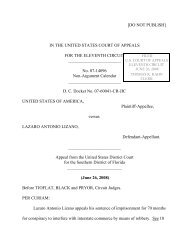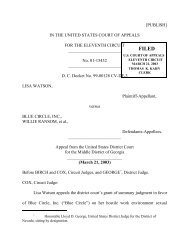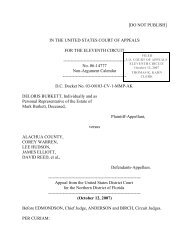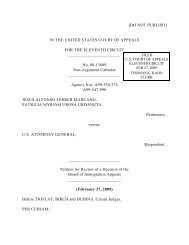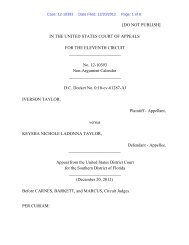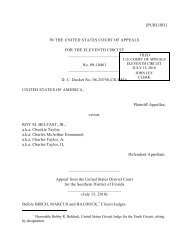Luis W. LeBron v. Secretary, Florida Department of - Court of ...
Luis W. LeBron v. Secretary, Florida Department of - Court of ...
Luis W. LeBron v. Secretary, Florida Department of - Court of ...
Create successful ePaper yourself
Turn your PDF publications into a flip-book with our unique Google optimized e-Paper software.
Case: 11-15258 Date Filed: 02/26/2013 Page: 1 <strong>of</strong> 38<br />
IN THE UNITED STATES COURT OF APPEALS<br />
FOR THE ELEVENTH CIRCUIT<br />
________________________<br />
No. 11-15258<br />
________________________<br />
D.C. Docket No. 6:11-cv-01473-MSS-DAB<br />
LUIS W. LEBRON,<br />
Individually and as Class Representative,<br />
versus<br />
SECRETARY, FLORIDA DEPARTMENT OF<br />
CHILDREN AND FAMILIES,<br />
________________________<br />
Appeal from the United States District <strong>Court</strong><br />
for the Middle District <strong>of</strong> <strong>Florida</strong><br />
________________________<br />
(February 26, 2013)<br />
[PUBLISH]<br />
Plaintiff–Appellee,<br />
Defendant–Appellant.<br />
Before BARKETT and JORDAN, Circuit Judges, and HALL, * District Judge.<br />
BARKETT, Circuit Judge:<br />
* Honorable James Randal Hall, United States District Judge for the Southern District <strong>of</strong><br />
Georgia, sitting by designation.
The <strong>Secretary</strong> <strong>of</strong> the <strong>Florida</strong> <strong>Department</strong> <strong>of</strong> Children and Families (“State”)<br />
appeals from the district court’s order enjoining the State <strong>of</strong> <strong>Florida</strong> from requiring<br />
<strong>Luis</strong> W. Lebron to submit to a suspicionless drug test pursuant to Section 414.0652<br />
<strong>of</strong> the <strong>Florida</strong> Statutes, as a condition for receipt <strong>of</strong> government-provided monetary<br />
assistance for which he was otherwise qualified.<br />
Lebron is an honorably discharged veteran <strong>of</strong> the United States Navy,<br />
college student, single unmarried father and sole caretaker <strong>of</strong> his young child.<br />
Lebron resides with and also cares for his disabled mother, who subsists on Social<br />
Security Disability benefits. In July 2011, Lebron applied for financial assistance<br />
benefits for himself and his son through <strong>Florida</strong>’s Temporary Assistance for Needy<br />
Families program (“TANF”), which, if he were eligible, would have provided him<br />
with a maximum <strong>of</strong> $241 per month to assist in the support <strong>of</strong> himself and his<br />
child.<br />
Case: 11-15258 Date Filed: 02/26/2013 Page: 2 <strong>of</strong> 38<br />
TANF is a block grant program in which the federal government provides<br />
states with funds to assist needy families with short term financial assistance and<br />
with finding employment. The State, through the <strong>Department</strong> <strong>of</strong> Children and<br />
Families (“DCF”), has been administering the TANF program since its creation as<br />
part <strong>of</strong> the Personal Responsibility and Work Opportunity Reconciliation Act in<br />
1996. Lebron met all <strong>of</strong> the program’s eligibility requirements, but DCF<br />
ultimately denied his application because Lebron refused to submit to <strong>Florida</strong>’s<br />
2
newly-enacted, mandatory drug testing, which is a final condition <strong>of</strong> eligibility for<br />
TANF benefits in <strong>Florida</strong>.<br />
Case: 11-15258 Date Filed: 02/26/2013 Page: 3 <strong>of</strong> 38<br />
<strong>Florida</strong>’s mandatory drug-testing requirement for all TANF applicants was<br />
enacted in May 2011. See Fla. Stat. § 414.0652 (2011). Under the statute, when<br />
an individual applies, he is notified that he will be required to submit to and pay for<br />
drug testing as a condition <strong>of</strong> receiving TANF benefits. Id. § 414.0652(2)(a). If<br />
the applicant submits to the drug testing and tests negative, the cost <strong>of</strong> the test will<br />
be reimbursed to the applicant through a one-time increase in his TANF benefits.<br />
Id. If the applicant tests positive for controlled substances, he is ineligible to<br />
receive TANF benefits for one year, id. § 414.0652(1)(b), but can reapply in six<br />
months if he completes a substance abuse treatment program and passes another<br />
drug test, both at his own expense, id. § 414.0652(1)(j). Although an adult<br />
applicant who fails the drug test is ineligible for TANF benefits, the applicant’s<br />
dependent child may still receive TANF benefits so long as the adult designates an<br />
appropriate protective payee to receive the child’s benefits. Id. § 414.0652(3).<br />
However, the individual who wishes to serve as the protective payee must also<br />
submit to and pass mandatory drug testing to receive benefits for the child, even<br />
though he is not requesting any TANF benefits for himself. Id. § 414.0652(3)(c).<br />
In addition to the mandatory drug test, applicants are required to sign a<br />
release acknowledging their consent to be tested. Id. § 414.0652(2)(e). At the<br />
3
Case: 11-15258 Date Filed: 02/26/2013 Page: 4 <strong>of</strong> 38<br />
time Lebron applied for TANF benefits, he was notified <strong>of</strong> <strong>Florida</strong>’s mandatory<br />
drug testing requirement and that he was required to sign the release before DCF<br />
would allow him to proceed with the application process. Lebron signed the<br />
release, completed the application process and was found eligible for TANF<br />
benefits. However, he did not submit to the drug test, but instead filed this lawsuit<br />
seeking to enjoin the enforcement <strong>of</strong> <strong>Florida</strong>’s mandatory suspicionless drug<br />
testing as a violation <strong>of</strong> his and all other TANF applicants’ Fourth Amendment<br />
right to be free from unreasonable searches and seizures. The district court granted<br />
a preliminary injunction against the enforcement <strong>of</strong> the drug testing statute against<br />
Lebron and the State agreed to discontinue its drug testing regime as to all TANF<br />
applicants until this litigation is fully resolved.<br />
I. Standard <strong>of</strong> Review<br />
Although we review the district court’s grant <strong>of</strong> a preliminary injunction for<br />
an abuse <strong>of</strong> discretion, underlying questions <strong>of</strong> law are reviewed de novo, and the<br />
district court’s factual determinations cannot be disturbed unless clearly erroneous,<br />
see United States v. Alabama, 691 F.3d 1269, 1281 (11th Cir. 2012). To grant a<br />
preliminary injunction, the district court must determine that the moving party has<br />
established: “(1) a substantial likelihood <strong>of</strong> success on the merits; (2) that<br />
irreparable injury will be suffered unless the injunction is issued; (3) the threatened<br />
injury to the moving party outweighs whatever damage the proposed injunction<br />
4
Case: 11-15258 Date Filed: 02/26/2013 Page: 5 <strong>of</strong> 38<br />
might cause the non-moving party; and (4) if issued, the injunction would not be<br />
adverse to the public interest.” Keeton v. Anderson-Wiley, 664 F.3d 865, 868<br />
(11th Cir. 2011). Here, the State challenges only the district court’s conclusion<br />
that Lebron has shown a “substantial likelihood <strong>of</strong> success on the merits” <strong>of</strong> his<br />
claim that <strong>Florida</strong>’s mandatory suspicionless drug testing <strong>of</strong> TANF applicants<br />
violates his Fourth Amendment right against unreasonable searches. Accordingly,<br />
in reviewing the district court’s grant <strong>of</strong> the preliminary injunction, we do not<br />
resolve the merits <strong>of</strong> the constitutional claim, but instead address whether the<br />
district court abused its discretion in concluding that Lebron is substantially likely<br />
to succeed in establishing that <strong>Florida</strong>’s drug testing regime for TANF applicants<br />
violates his Fourth Amendment rights.<br />
II. Discussion<br />
The Fourth Amendment protects the rights <strong>of</strong> individuals “to be secure in<br />
their persons, houses, papers, and effects, against unreasonable searches and<br />
seizures.” U.S. Const. amend. IV. It is undisputed and well-established that<br />
government-mandated drug testing is a “search” within the meaning <strong>of</strong> the Fourth<br />
Amendment. See e.g., Bd. <strong>of</strong> Educ. v. Earls, 536 U.S. 822, 828 (2002); Chandler<br />
v. Miller, 520 U.S. 305, 313 (1997); Vernonia Sch. Dist. 47J v. Acton, 515 U.S.<br />
646, 652 (1995); Nat’l Treasury Emps. Union v. Von Raab, 489 U.S. 656, 665<br />
(1989); Skinner v. Ry. Labor Execs.’ Ass’n, 489 U.S. 602, 614–15 (1989). Thus,<br />
5
Case: 11-15258 Date Filed: 02/26/2013 Page: 6 <strong>of</strong> 38<br />
the question before us is whether <strong>Florida</strong>’s mandatory, suspicionless drug-testing<br />
<strong>of</strong> all TANF applicants is a constitutionally reasonable search under the Fourth<br />
Amendment. See Skinner, 489 U.S. at 618–19 (“To hold that the Fourth<br />
Amendment is applicable to . . . drug and alcohol testing . . . is only to begin the<br />
inquiry into the standards governing such intrusions.”).<br />
Ordinarily, to be reasonable, a search must be based on individualized<br />
suspicion <strong>of</strong> wrongdoing. See e.g., Chandler, 520 U.S. at 308 (“[The Fourth<br />
Amendment’s] restraint on government conduct generally bars <strong>of</strong>ficials from<br />
undertaking a search or seizure absent individualized suspicion.”). In most cases,<br />
this standard is met only when a search “is accomplished pursuant to a judicial<br />
warrant issued upon probable cause.” Skinner, 489 U.S. at 619.<br />
However, the Supreme <strong>Court</strong> has upheld as reasonable searches without a<br />
showing <strong>of</strong> individualized suspicion in certain very limited and exceptional<br />
circumstances. See New Jersey v. T.L.O., 469 U.S. 325, 351 (1985) (Blackmun,<br />
J., concurring in judgment) (explaining that a court may substitute its own<br />
reasonableness balancing for that <strong>of</strong> the Fourth Amendment’s warrant and<br />
probable cause requirement only in those “exceptional circumstances” where<br />
special needs have been established). But to establish these limited and<br />
exceptional circumstances that justify the suspension <strong>of</strong> Fourth Amendment<br />
protections, the Supreme <strong>Court</strong> has required the government to make a threshold<br />
6
Case: 11-15258 Date Filed: 02/26/2013 Page: 7 <strong>of</strong> 38<br />
showing that there are “special needs, beyond the normal need for law<br />
enforcement, [which] make the warrant and probable-cause requirement<br />
impracticable.” Skinner, 489 U.S. at 619 (internal quotation omitted). 1 Not only<br />
must the government identify the special needs that make the warrant and<br />
probable-cause requirement impracticable but it must establish that those special<br />
needs are “substantial.” See Chandler, 520 U.S at 318 (“Our precedents establish<br />
that the pr<strong>of</strong>fered special need for drug testing must be substantial.”). Only if the<br />
government is able to make a showing <strong>of</strong> substantial special needs will the court<br />
thereafter “undertake a context-specific inquiry, examining closely the competing<br />
private and public interests advanced by the parties,” to determine the<br />
reasonableness <strong>of</strong> the search. Id. at 314; see also T.L.O., 469 U.S. at 351<br />
1 The origins <strong>of</strong> the <strong>Court</strong>’s “special needs” test has been summed up as follows:<br />
The term “special needs” first appeared in Justice Blackmun’s opinion<br />
concurring in the judgment in New Jersey v. T.L.O., 469 U.S. 325, 351<br />
(1985). In his concurrence, Justice Blackmun agreed with the <strong>Court</strong> that<br />
there are limited exceptions to the probable-cause requirement, in which<br />
reasonableness is determined by “a careful balancing <strong>of</strong> governmental and<br />
private interests,” but concluded that such a test should only be applied “in<br />
those exceptional circumstances in which special needs, beyond the normal<br />
need for law enforcement, make the warrant and probable-cause<br />
requirement impracticable. . . .” This <strong>Court</strong> subsequently adopted the<br />
“special needs” terminology in O’Connor v. Ortega, 480 U.S. 709, 720<br />
(1987) (plurality opinion), and Griffin v. Wisconsin, 483 U.S. 868, 873<br />
(1987), concluding that, in limited circumstances, a search unsupported by<br />
either warrant or probable cause can be constitutional when “special needs”<br />
other than the normal need for law enforcement provide sufficient<br />
justification.<br />
Ferguson v. City <strong>of</strong> Charleston, 532 U.S. 67, 76 n.7 (2001).<br />
7
Case: 11-15258 Date Filed: 02/26/2013 Page: 8 <strong>of</strong> 38<br />
(Blackmun, J., concurring in judgment) (explaining that the reasonableness<br />
balancing test should be applied only if special needs have been established).<br />
In the specific context <strong>of</strong> government-mandated drug testing programs, the<br />
Supreme <strong>Court</strong> has exempted such programs from the Fourth Amendment’s<br />
warrant and probable cause requirement only where such testing “fit[s] within the<br />
closely guarded category <strong>of</strong> constitutionally permissible suspicionless searches.”<br />
Chandler, 520 U.S. at 309. To fall within this “closely guarded category,” the<br />
<strong>Court</strong> has made clear that its “precedents establish that the pr<strong>of</strong>fered special need<br />
for drug testing must be substantial.” Id. at 318. The <strong>Court</strong> has recognized two<br />
concerns that present such “exceptional circumstances,” which are sufficiently<br />
“substantial” to qualify as special needs meriting an exemption to the Fourth<br />
Amendment’s warrant and probable cause requirement: the specific risk to public<br />
safety by employees engaged in inherently dangerous jobs and the protection <strong>of</strong><br />
children entrusted to the public school system’s care and tutelage. In contrast, this<br />
“closely guarded category” does not include a policy requiring candidates for<br />
public <strong>of</strong>fice to submit to drug testing because the <strong>Court</strong> concluded that the state’s<br />
asserted need to “signify that candidates, if elected, will be fit to serve their<br />
constituents free from the influence <strong>of</strong> illegal drugs” was merely “symbolic” and<br />
8
not substantially special to warrant an exemption from the Fourth Amendment. 2 Id.<br />
at 321–22.<br />
With reference to ensuring public safety in well-defined circumstances, the<br />
<strong>Court</strong>, in Skinner and Von Raab, recognized a special need where “[railroad]<br />
employees are engaged in safety-sensitive tasks,” Skinner, 489 U.S. at 620, and<br />
where the “sensitive positions” <strong>of</strong> certain United States Customs employees<br />
present “extraordinary safety and national security hazards,” Von Raab, 489 U.S.<br />
at 666, 674.<br />
Case: 11-15258 Date Filed: 02/26/2013 Page: 9 <strong>of</strong> 38<br />
In Skinner, the <strong>Court</strong> permitted mandatory drug testing <strong>of</strong> railroad<br />
employees involved in train accidents under a program that had been implemented<br />
in response to “evidence indicating that on-the-job intoxication was a significant<br />
problem in the railroad industry” and that alcohol or drug use was a factor in<br />
several accidents that resulted in numerous fatalities, other injuries and property<br />
damage. 489 U.S. at 607. Given the “safety-sensitive tasks” that the railroad<br />
employees engaged in, the <strong>Court</strong> determined that the government presented a<br />
2 We also note that the Supreme <strong>Court</strong> in Ferguson struck down as unconstitutional a<br />
state hospital policy <strong>of</strong> drug testing pregnant women who medical staff considered to be potential<br />
cocaine users. 532 U.S. at 86. The <strong>Court</strong>, however, distinguished the testing regime in Ferguson<br />
from its prior drug testing cases because the program was established in conjunction with law<br />
enforcement <strong>of</strong>ficials so that test results could be turned over for criminal prosecution. 532 U.S.<br />
at 84 (“Given the primary purpose <strong>of</strong> the Charleston program, which was to use the threat <strong>of</strong><br />
arrest and prosecution in order to force women into treatment, and given the extensive<br />
involvement <strong>of</strong> law enforcement <strong>of</strong>ficials at every stage <strong>of</strong> the policy, this case simply does not<br />
fit within the closely guarded category <strong>of</strong> special needs.”). The <strong>Court</strong> also noted that the privacy<br />
interests were much greater in Ferguson than its other drug testing cases. Id. at 78.<br />
9
Case: 11-15258 Date Filed: 02/26/2013 Page: 10 <strong>of</strong> 38<br />
special need <strong>of</strong> “ensuring the safety <strong>of</strong> the traveling public and <strong>of</strong> the employees<br />
themselves” which justified a policy prohibiting the use <strong>of</strong> alcohol or drugs while<br />
on duty. Id. at 620–21. Having found that the government established “special<br />
needs,” the <strong>Court</strong> went on to weigh the government’s need to “monitor compliance<br />
with the[ ] restrictions” <strong>of</strong> on-the-job drug and alcohol use against the privacy<br />
interests <strong>of</strong> the railroad employees. Id. at 621. The <strong>Court</strong> explained that the<br />
government had a compelling interest in drug testing because “[e]mployees subject<br />
to the tests discharge duties fraught with such risks <strong>of</strong> injury to others that even a<br />
momentary lapse <strong>of</strong> attention can have disastrous consequences. . . . [They] can<br />
cause great human loss before any signs <strong>of</strong> impairment become noticeable to<br />
supervisors or others.” Id. at 628. On the other hand, railroad employees’<br />
“expectations <strong>of</strong> privacy . . . are diminished by reason <strong>of</strong> their participation in an<br />
industry that is regulated pervasively to ensure safety, a goal dependent, in<br />
substantial part, on the health and fitness <strong>of</strong> covered employees.” Id. at 627.<br />
In Von Raab, the <strong>Court</strong> likewise sustained a United States Customs Service<br />
policy that made drug tests a condition <strong>of</strong> working in positions directly involving<br />
drug interdiction or requiring the employee to carry a firearm. 489 U.S. at 660–61.<br />
The <strong>Court</strong> pointed out that the Customs Service, in performing its “almost unique<br />
mission,” id. at 674, was our “first line <strong>of</strong> defense against . . . the veritable national<br />
crisis in law enforcement caused by smuggling <strong>of</strong> illicit narcotics,” id. at 668, and<br />
10
Case: 11-15258 Date Filed: 02/26/2013 Page: 11 <strong>of</strong> 38<br />
that “[m]any <strong>of</strong> the Service’s employees are <strong>of</strong>ten exposed to this criminal element<br />
and to the controlled substances it seeks to smuggle into the country,” id. at 669. 3<br />
As a result, our “national interest in self-protection could be irreparably damaged”<br />
if Customs’ employees’ performance on the job was impaired by drug use. Id. at<br />
670. The <strong>Court</strong> also noted that “Customs employees who may use deadly force<br />
plainly ‘discharge duties fraught with such risks <strong>of</strong> injury to others that even a<br />
momentary lapse <strong>of</strong> attention can have disastrous consequences.’” Id. at 670<br />
(quoting Skinner, 489 U.S. at 628). Thus, given the substantial danger <strong>of</strong> physical<br />
harm, threat to national security, and numerous temptations inherent in the affected<br />
positions involved in the interdiction <strong>of</strong> drugs being smuggled into the country, the<br />
<strong>Court</strong> agreed that the government demonstrated a special need in ensuring against<br />
the creation <strong>of</strong> such risks within the Customs Service. Id. at 670–71.<br />
Having found a substantial special need, the <strong>Court</strong>, in the subsequent<br />
weighing <strong>of</strong> the competing government and individual interests, determined that<br />
affected Customs’ employees, like the railroad workers in Skinner, have a<br />
diminished expectation <strong>of</strong> privacy with respect to the intrusions occasioned by the<br />
tests administered. “Unlike most private citizens or government employees in<br />
general, employees involved in drug interdiction [and those who carry firearms]<br />
3 As an example <strong>of</strong> the sort <strong>of</strong> illicit temptation potentially faced by Customs’ employees,<br />
the <strong>Court</strong> noted that “Customs <strong>of</strong>ficers have been the targets <strong>of</strong> bribery by drug smugglers on<br />
numerous occasions, and several have been removed from the Service for accepting bribes.”<br />
Von Raab, 489 U.S. at 669.<br />
11
Case: 11-15258 Date Filed: 02/26/2013 Page: 12 <strong>of</strong> 38<br />
reasonably should expect effective inquiry into their fitness and probity. . . .<br />
[T]hese employees cannot reasonably expect to keep from the Service personal<br />
information that bears directly on their fitness.” Id. at 672.<br />
Other than the certain well-defined public safety concerns, the “closely<br />
guarded category” includes suspicionless drug testing only in one other context—<br />
the public school setting. In Vernonia and Earls, the <strong>Court</strong> upheld as reasonable<br />
under the Fourth Amendment school district policies that provided for random<br />
drug testing <strong>of</strong> public school children who participated in the school systems’<br />
athletics programs and non-athletic extracurricular activities, respectively. The<br />
<strong>Court</strong> noted that “‘special needs’ inhere in the public school context,” Earls, 536<br />
U.S. at 829, given the need for “swift and informal disciplinary procedures” and<br />
“the substantial need <strong>of</strong> teachers and administrators for freedom to maintain order<br />
in the schools.” Vernonia, 515 U.S. at 653 (quoting T.L.O., 469 U.S. at 340–41).<br />
The <strong>Court</strong> also explained that schools have an important concern with deterring<br />
drug use by schoolchildren “for whom it has undertaken a special responsibility <strong>of</strong><br />
care and direction.” Vernonia, 515 U.S. at 662; Earls, 536 U.S. at 834.<br />
In Vernonia, in permitting the drug testing <strong>of</strong> student athletes, the <strong>Court</strong><br />
emphasized the findings that “athletes were the leaders <strong>of</strong> the drug culture” in this<br />
school district, which was fueling a “rebellion” that led to an increase in<br />
disciplinary problems that “had reached epidemic proportions.” 515 U.S. at 649,<br />
12
Case: 11-15258 Date Filed: 02/26/2013 Page: 13 <strong>of</strong> 38<br />
663. The deleterious effects <strong>of</strong> drug use were <strong>of</strong> particular concern in the specific<br />
context <strong>of</strong> student athletics, which the <strong>Court</strong> noted “increases the risk <strong>of</strong> sports-<br />
related injury” and affects “motivation, memory, judgment, reaction, coordination,<br />
and performance.” Id. at 649. Likewise in Earls, the <strong>Court</strong> reiterated “the<br />
importance <strong>of</strong> the governmental concern in preventing drug use by schoolchildren”<br />
and determined that the “health and safety risks identified in Vernonia” applied<br />
with “equal force” in the context <strong>of</strong> school children participating in extracurricular<br />
activities. 536 U.S. at 834. 4<br />
In both Vernonia and Earls, the government’s special need in the unique<br />
context <strong>of</strong> the public school setting was found to outweigh the individual privacy<br />
rights <strong>of</strong> the students—rights which the <strong>Court</strong> concluded are “limited in a public<br />
school environment where the State is responsible for maintaining discipline,<br />
health, and safety.” Earls, 536 U.S. at 830; see also Vernonia, 515 U.S. at 656<br />
(“Fourth Amendment rights . . . are different in public schools than elsewhere[.]”).<br />
Although the <strong>Court</strong> in both Vernonia and Earls had before it evidence <strong>of</strong> a genuine<br />
drug problem among the covered students, the <strong>Court</strong> cautioned that “[t]he most<br />
significant element . . . is . . . that the Policy was undertaken in furtherance <strong>of</strong> the<br />
4 We note that in both Vernonia and Earls, the <strong>Court</strong> acknowledged that the school<br />
districts had presented specific evidence <strong>of</strong> drug use by the relevant population <strong>of</strong> students and<br />
that the <strong>Court</strong> would not “second-guess the finding <strong>of</strong> the district court that . . . the [School<br />
District] was faced with a ‘drug problem’ when it adopted the policy.” Earls, 536 U.S. at 834.<br />
13
Case: 11-15258 Date Filed: 02/26/2013 Page: 14 <strong>of</strong> 38<br />
government’s responsibilities, under a public school system, as guardian and tutor<br />
<strong>of</strong> children entrusted to its care.” Vernonia, 515 U.S. at 665.<br />
Thus in the context <strong>of</strong> government mandated drug testing, when the <strong>Court</strong><br />
has permitted the suspension <strong>of</strong> the Fourth Amendment protections requiring<br />
individualized suspicion it has done so only in the “closely guarded categor[ies]”<br />
enumerated above where the asserted special need addresses a substantial concern<br />
for public safety or where the state is fulfilling its well-recognized role as the<br />
guardian and tutor <strong>of</strong> public school children. That is not to say that there cannot be<br />
other governmental needs that are sufficiently substantial to qualify as a special<br />
need for Fourth Amendment purposes. Moreover, in subsequently weighing the<br />
competing government and individual interests, the <strong>Court</strong> has noted that the<br />
affected individuals have a diminished expectation <strong>of</strong> privacy given the nature <strong>of</strong><br />
their employment or status as a public school student.<br />
Conversely, in Chandler v. Miller, 520 U.S. 305 (1997), the Supreme <strong>Court</strong><br />
rejected the state <strong>of</strong> Georgia’s argument that it had a special need that supported<br />
the mandatory drug testing <strong>of</strong> all candidates for state public <strong>of</strong>fice. Georgia argued<br />
that unlawful drug use by elected <strong>of</strong>ficials “draws into question an <strong>of</strong>ficial’s<br />
judgment and integrity; jeopardizes the discharge <strong>of</strong> public functions[;] . . . and<br />
undermines public confidence and trust in elected <strong>of</strong>ficials.” Chandler, 520 U.S. at<br />
318. After distinguishing Skinner, Von Raab and Vernonia, the <strong>Court</strong> reiterated<br />
14
Case: 11-15258 Date Filed: 02/26/2013 Page: 15 <strong>of</strong> 38<br />
that “[o]ur precedents establish that the pr<strong>of</strong>fered special need for drug testing<br />
must be substantial—important enough to override the individual’s acknowledged<br />
privacy interest, sufficiently vital to suppress the Fourth Amendment’s normal<br />
requirement <strong>of</strong> individualized suspicion.” Id. In concluding that Georgia’s<br />
purported special needs were not substantial, the <strong>Court</strong> noted that Georgia failed to<br />
put forth “any indication <strong>of</strong> a concrete danger demanding departure from the<br />
Fourth Amendment’s main rule.” Id. at 319. (“Nothing . . . hints that the hazards<br />
[the State] broadly describe are real and not simply hypothetical for Georgia’s<br />
polity.”). Not only did Georgia fail to put forth “evidence <strong>of</strong> a drug problem<br />
among the State’s elected <strong>of</strong>ficials,” but the <strong>Court</strong> also noted that those <strong>of</strong>ficials<br />
were not involved in high-risk or safety-sensitive tasks nor were they part <strong>of</strong> any<br />
drug interdiction effort. Id. 321–22. Thus, all that was left was an image that the<br />
State wished to project that “candidates, if elected, will be fit to serve their<br />
constituents,” at least to the extent <strong>of</strong> being “free from the influence <strong>of</strong> illegal<br />
drugs.” Id. at 321. 5 However, the <strong>Court</strong> refused to credit this interest as a<br />
substantial special need, but instead concluded the need was merely “symbolic”<br />
and would not justify suspicionless drug testing. Id. at 322.<br />
5 The <strong>Court</strong> also pointed out that Georgia failed to show “why ordinary law enforcement<br />
methods would not suffice to apprehend such addicted individuals, should they appear in the<br />
limelight <strong>of</strong> a public stage.” Id. at 320.<br />
15
For reasons similar to those expressed by the <strong>Court</strong> in Chandler, we cannot<br />
say that the district court abused its discretion in determining that the State failed<br />
to establish a substantial special need for mandatory drug testing <strong>of</strong> TANF<br />
applicants. Here, the State argues that there is a “special need” to test TANF<br />
applicants because TANF funds should not be used for drugs as drug use<br />
undermines the program’s goals <strong>of</strong> moving applicants into employment and<br />
promoting child welfare and family stability. But this argument, which assumes<br />
drug use, begs the question. The question is not whether drug use is detrimental to<br />
the goals <strong>of</strong> the TANF program, which it might be. Instead, the only pertinent<br />
inquiry is whether there is a substantial special need for mandatory, suspicionless<br />
drug testing <strong>of</strong> TANF recipients when there is no immediate or direct threat to<br />
public safety, when those being searched are not directly involved in the frontlines<br />
<strong>of</strong> drug interdiction, when there is no public school setting where the government<br />
has a responsibility for the care and tutelage <strong>of</strong> its young students, or when there<br />
are no dire consequences or grave risk <strong>of</strong> imminent physical harm as a result <strong>of</strong><br />
waiting to obtain a warrant if a TANF recipient, or anyone else for that matter, is<br />
suspected <strong>of</strong> violating the law. We conclude that, on this record, the answer to that<br />
question <strong>of</strong> whether there is a substantial special need for mandatory suspicionless<br />
drug testing is “no.”<br />
Case: 11-15258 Date Filed: 02/26/2013 Page: 16 <strong>of</strong> 38<br />
16
Case: 11-15258 Date Filed: 02/26/2013 Page: 17 <strong>of</strong> 38<br />
As the district court found, the State failed to <strong>of</strong>fer any factual support or to<br />
present any empirical evidence <strong>of</strong> a “concrete danger” <strong>of</strong> illegal drug use within<br />
<strong>Florida</strong>’s TANF population. See id. at 319. The evidence in this record does not<br />
suggest that the population <strong>of</strong> TANF recipients engages in illegal drug use or that<br />
they misappropriate government funds for drugs at the expense <strong>of</strong> their own and<br />
their children’s basic subsistence. The State has presented no evidence that simply<br />
because an applicant for TANF benefits is having financial problems, he is also<br />
drug addicted or prone to fraudulent and neglectful behavior. 6<br />
6 In concluding that the State failed to present evidence in support <strong>of</strong> its alleged special<br />
needs, the district court also noted that the State failed to address the only competent evidence in<br />
the record about drug use among TANF recipients. That evidence derived from a study, known<br />
as the Demonstration Project, which had been developed and implemented by DCF in 1998.<br />
DCF conducted the study after the State passed legislation requiring the Demonstration Project<br />
to test empirically whether individuals who applied for TANF benefits were likely to abuse drugs<br />
and whether such abuse affected employment opportunities. The legislation permitted drug<br />
testing only <strong>of</strong> those individuals for whom DCF had reasonable cause to believe were engaged in<br />
illegal drug use. Over an eighteen-month period, the researchers on the Demonstration Project<br />
used a written test to screen over 8,700 TANF applicants for reasonable cause to believe they<br />
were substance abusers. Of those screened, 1447 applicants were identified as potential<br />
substance abusers and required to undergo urinalysis. Only 5.1% (353 individuals) <strong>of</strong> the total<br />
screened population tested positive. The researchers noted that this rate <strong>of</strong> drug use was lower<br />
than had been reported in other national studies <strong>of</strong> welfare recipients.<br />
The Demonstration Project found no discernible difference in the employment rate and<br />
level <strong>of</strong> government assistance provided to recipients who were drug users and those who were<br />
non-users. The researchers concluded that: (1) because it is difficult to determine the extent <strong>of</strong><br />
drug use among welfare beneficiaries, such estimates should not be used for sanctioning<br />
purposes and (2) drug testing may be <strong>of</strong> little benefit given the finding <strong>of</strong> inconsequential<br />
differences between drug users and non-users on employability and reliance on government<br />
benefits.<br />
The district court found that the results <strong>of</strong> the Demonstration Project undercut the State’s<br />
rationale for its asserted need for drug testing. Specifically, the district court noted that the rate<br />
<strong>of</strong> drug use reported in the Demonstration Project <strong>of</strong> 5.1% is lower than <strong>Florida</strong>’s general<br />
population, currently estimated to be around 8.13%, thereby suggesting that TANF applicants are<br />
no more likely than any other recipient <strong>of</strong> government benefits to misuse funds for drug use or<br />
expose their children to drugs. The district court also noted that study’s conclusion regarding<br />
17
Case: 11-15258 Date Filed: 02/26/2013 Page: 18 <strong>of</strong> 38<br />
While “[a] demonstrated problem <strong>of</strong> drug abuse, [is] not in all cases<br />
necessary to the validity <strong>of</strong> a testing regime,” such evidence could “clarify” and<br />
“substantiate” the dangers presented by such drug use and whether those dangers<br />
were pertinent to the government’s asserted special need for drug testing,<br />
Chandler, 520 U.S. at 319. Thus, unlike Skinner, Vernonia, and Earls, in which<br />
the government presented evidence <strong>of</strong> drug use within the affected populations,<br />
here, the State presented no empirical evidence to bolster its special needs<br />
argument that suspicionless drug testing <strong>of</strong> TANF applicants is in any way<br />
warranted. See id. (noting that evidence <strong>of</strong> drug use in Skinner and Vernonia<br />
“bolstered the Government’s and school <strong>of</strong>ficials’ arguments that drug-testing<br />
programs were warranted and appropriate”). 7 As the <strong>Court</strong> noted in Chandler,<br />
employability also contradicts the State’s rationale that drug users are less likely to find and to<br />
keep employment.<br />
Although we find no error in the district court’s finding that the results <strong>of</strong> the<br />
Demonstration Project hinders rather than supports the validity <strong>of</strong> the State’s asserted special<br />
needs, we do not mean to suggest that there is any affirmative burden on the part <strong>of</strong> the affected<br />
population to bring forth evidence refuting the legitimacy <strong>of</strong> the State’s purported special needs<br />
for drug testing. To the contrary, the Supreme <strong>Court</strong> has unequivocally stated that it is the state<br />
which must show a substantial special need to justify its drug testing. See e.g., Chandler, 520<br />
U.S. at 318 (“Georgia has failed to show, in justification <strong>of</strong> [its drug testing statute], a special<br />
need <strong>of</strong> that kind.”).<br />
Moreover, the district court did not abuse its discretion in finding that the other evidence<br />
submitted by the State failed to support the finding <strong>of</strong> a special need for drug testing. The three<br />
affidavits from DCF employees only provided a factual description <strong>of</strong> the TANF program and<br />
how the drug testing would be implemented. None <strong>of</strong> the affidavits spoke to the State’s need for<br />
suspicionless drug testing. Likewise, the district court did not err in rejecting, as irrelevant or<br />
non-persuasive, the reports concerning drug use in the welfare populations.<br />
7 In pointing out that there is no evidence <strong>of</strong> a demonstrated problem <strong>of</strong> drug use within<br />
<strong>Florida</strong>’s TANF population to support the State’s special needs argument, we in no way are<br />
18
Case: 11-15258 Date Filed: 02/26/2013 Page: 19 <strong>of</strong> 38<br />
“[n]othing . . . hints that the hazards [the State] broadly describe are real and not<br />
simply hypothetical.” Id. at 319.<br />
There is nothing so special or immediate about the government’s interest in<br />
ensuring that TANF recipients are drug free so as to warrant suspension <strong>of</strong> the<br />
Fourth Amendment. The only known and shared characteristic <strong>of</strong> the individuals<br />
who would be subjected to <strong>Florida</strong>’s mandatory drug testing program is that they<br />
are financially needy families with children. Yet, there is nothing inherent to the<br />
condition <strong>of</strong> being impoverished that supports the conclusion that there is a<br />
“concrete danger” that impoverished individuals are prone to drug use or that<br />
should drug use occur, that the lives <strong>of</strong> TANF recipients are “fraught with such<br />
risks <strong>of</strong> injury to others that even a momentary lapse <strong>of</strong> attention can have<br />
disastrous consequences.” Skinner, 489 U.S. at 628; see also Von Raab, 489 U.S.<br />
at 670. 8 Thus, the State’s argument that it has a special need to ensure that the<br />
suggesting that evidence <strong>of</strong> drug use within the TANF population would, in and <strong>of</strong> itself, suffice<br />
to establish a substantial special need for mandatory drug testing. Nor do we read any <strong>of</strong> the<br />
Supreme <strong>Court</strong>’s drug testing cases to say that empirical evidence <strong>of</strong> drug use is sufficient to<br />
establish a special need. Instead, all that the <strong>Court</strong> has said <strong>of</strong> actual evidence <strong>of</strong> drug use is that<br />
it is neither necessary nor sufficient to establish the type <strong>of</strong> substantial special needs that permit a<br />
drug testing regime to fall within the closely guarded category <strong>of</strong> permissible suspicionless<br />
searches.<br />
8 We also note that TANF recipients, much like the elected <strong>of</strong>ficials in Chandler who<br />
<strong>of</strong>ten “appear in the limelight <strong>of</strong> a public stage,” 520 U.S. at 320, are subject to regular oversight<br />
and monitoring by <strong>Florida</strong>’s welfare <strong>of</strong>ficials as part <strong>of</strong> verifying their ongoing eligibility for the<br />
TANF program. They are certainly far more visible to <strong>Florida</strong>’s welfare <strong>of</strong>ficials than non-<br />
TANF recipient parents struggling with drug addiction. Accordingly, just as the <strong>Court</strong> in<br />
Chandler concluded that there was no reason why ordinary law enforcement would not suffice to<br />
deal with drug addicted elected <strong>of</strong>ficials, id., we see no reason why here, <strong>Florida</strong> welfare <strong>of</strong>ficials<br />
19
Case: 11-15258 Date Filed: 02/26/2013 Page: 20 <strong>of</strong> 38<br />
goals <strong>of</strong> the TANF program are not jeopardized by the effects <strong>of</strong> drug use seems to<br />
rest on the presumption <strong>of</strong> unlawful drug use. But the Supreme <strong>Court</strong> has required<br />
that a state must present adequate factual support that there exists a “concrete<br />
danger,” Chandler, 520 U.S. at 319, not simply conjecture that there is a substantial<br />
“special need” that cannot be met by ordinary law enforcement methods<br />
warranting the drastic action <strong>of</strong> abrogating an individual’s constitutional right to be<br />
free from unreasonable government searches.<br />
Moreover none <strong>of</strong> the State’s asserted concerns will be ameliorated by drug<br />
testing. While we recognize that <strong>Florida</strong> has a significant interest in promoting<br />
child welfare, the State has presented no evidence that the general welfare <strong>of</strong> the<br />
children in the TANF program is at greater risk absent its drug testing. Nor has the<br />
State shown that <strong>Florida</strong>’s children will be better protected because <strong>of</strong> mandatory<br />
drug testing <strong>of</strong> TANF applicants. As the district court noted, even if a parent tests<br />
positive for drugs and is precluded from receiving TANF funds, the TANF<br />
program has no impact on the familial and custodial relationships <strong>of</strong> its would-be<br />
participants. Again, there is no evidence that there is greater drug use and child<br />
abuse within the population <strong>of</strong> economically disadvantaged families who<br />
participate in the TANF program. However, even if child neglect or abuse, for<br />
would not be able to address drug addiction through normal law enforcement methods when, and<br />
if, it manifests itself in a given TANF household.<br />
20
Case: 11-15258 Date Filed: 02/26/2013 Page: 21 <strong>of</strong> 38<br />
whatever reasons, impacts the lives <strong>of</strong> families in the TANF program, <strong>Florida</strong> has a<br />
separate, well-established and comprehensive statutory, administrative and judicial<br />
scheme codified in Chapter 39 <strong>of</strong> the <strong>Florida</strong> Statutes, which governs <strong>Florida</strong>’s<br />
obligation to protect children from child abuse, abandonment and neglect. 9 See<br />
Fla. Stat. §§ 39.001–39.908.<br />
In short, we cannot say that the district court erred in determining that the<br />
State failed to meet its burden <strong>of</strong> showing a substantial special need permitting the<br />
suspension <strong>of</strong> the Fourth Amendment’s protections. See e.g., Ferguson, 532 U.S.<br />
at 81 (“In Chandler, however, we did not simply accept the State’s invocation <strong>of</strong> a<br />
‘special need.’ Instead, we carried out a ‘close review’ <strong>of</strong> the scheme at issue<br />
before concluding that the need in question was not ‘special,’ as that term has been<br />
defined in our cases.”). The simple fact <strong>of</strong> seeking public assistance does not<br />
deprive a TANF applicant <strong>of</strong> the same constitutional protection from unreasonable<br />
searches that all other citizens enjoy. Because we agree with the district court that<br />
the State failed to meet its burden in establishing a special need for its mandatory,<br />
suspicionless drug testing <strong>of</strong> TANF applicants, that ends our inquiry into the<br />
9 The State argues that Earls and Vernonia support its position that the government has a<br />
substantial concern over child welfare that justifies drug testing <strong>of</strong> TANF recipients. Although<br />
Earls and Vernonia found the existence <strong>of</strong> a special need that justified mandatory drug testing <strong>of</strong><br />
school children, it did so in the unique environment <strong>of</strong> the public school setting, where the State<br />
itself has a parens patriae obligation toward the children under its direct supervision and control.<br />
Earls, 536 U.S. at 834; Vernonia, 515 U.S. at 662. State <strong>of</strong>ficials are not in the same position vis<br />
a vis either the adult or child participants in the TANF program and thus, the child welfarerelated<br />
special need identified in Earls and Vernonia is inapplicable here.<br />
21
testing regime’s validity for Fourth Amendment purposes, and thus, we need not<br />
weigh any competing individual and governmental interests. See T.L.O., 469 U.S.<br />
at 351 (Blackmun, J., concurring in judgment) (explaining that the balancing <strong>of</strong><br />
government interests against the individual privacy interests takes place only if the<br />
government establishes a special need for drug testing).<br />
We turn then to the State’s alternative argument that even if we find no<br />
substantial special need supporting <strong>Florida</strong>’s mandatory drug testing <strong>of</strong> TANF<br />
recipients, the drug testing program is still constitutionally valid because it is based<br />
on consent. As noted, under <strong>Florida</strong>’s program, an applicant is required to sign an<br />
acknowledgment that he or she consents to drug testing. Accordingly, the State<br />
argues that because the drug test is administered only to those persons who have<br />
consented to the test and because a consented-to search is deemed reasonable,<br />
<strong>Florida</strong>’s mandatory drug testing program does not run afoul <strong>of</strong> the Fourth<br />
Amendment.<br />
Case: 11-15258 Date Filed: 02/26/2013 Page: 22 <strong>of</strong> 38<br />
We cannot say that the district court abused its discretion in concluding that<br />
the “State’s exaction <strong>of</strong> consent” failed to render the otherwise unconstitutional<br />
drug testing valid for Fourth Amendment purposes. We disagree with the State<br />
that the mandatory “consent,” which <strong>Florida</strong>’s drug-testing statute makes a<br />
condition to the receipt <strong>of</strong> benefits, is <strong>of</strong> any constitutional significance. Although<br />
a “search conducted pursuant to a valid consent is constitutionally permissible,”<br />
22
Case: 11-15258 Date Filed: 02/26/2013 Page: 23 <strong>of</strong> 38<br />
see Schneckloth v. Bustamonte, 412 U.S. 218, 222 (1973), a valid consent means<br />
one which is “in fact, freely and voluntarily given,” see Bumper v. North Carolina,<br />
391 U.S. 543, 548 (1968). The State’s assertion that the “consent” that is provided<br />
by TANF applicants renders the drug testing reasonable for Fourth Amendment<br />
purposes is belied by Supreme <strong>Court</strong> precedent, which has invalidated searches<br />
premised on consent where it has been shown that consent “was granted in<br />
submission to authority rather than as an understanding and intentional waiver <strong>of</strong> a<br />
constitutional right.” See Johnson v. United States, 333 U.S. 10, 13 (1948)<br />
(holding as invalid a search <strong>of</strong> defendant’s home which “was demanded under<br />
color <strong>of</strong> <strong>of</strong>fice” even though the government <strong>of</strong>ficials did not possess a search<br />
warrant); see also Bumper, 391 U.S. at 548–49 (“[The government’s] burden<br />
cannot be discharged by showing no more than acquiescence to a claim <strong>of</strong> lawful<br />
authority.”); Amos v. United States, 255 U.S. 313, 317 (1921) (“The contention<br />
that the constitutional rights <strong>of</strong> defendant were waived when his wife admitted to<br />
his home the government <strong>of</strong>ficers, who came, without warrant, demanding<br />
admission to make search <strong>of</strong> it under government authority, cannot be entertained. .<br />
. . [I]t is perfectly clear that under the implied coercion here presented, no such<br />
waiver was intended or effected.”).<br />
By informing TANF applicants that the drug test is one <strong>of</strong> many conditions<br />
to receiving this government-issued benefit and that the applicant’s refusal to give<br />
23
consent means that he is ineligible to receive TANF assistance, the State conveys a<br />
message that it has the unfettered lawful authority to require such drug testing—<br />
period. But it does not and can only do so upon a showing <strong>of</strong> individualized<br />
suspicion or a special need beyond the need for normal law enforcement, both <strong>of</strong><br />
which are absent in <strong>Florida</strong>’s drug testing program. Accordingly, a TANF<br />
applicant’s “consent” to the testing by signing a form waiving his constitutional<br />
rights amounts to nothing more than “submission to authority rather than . . . an<br />
understanding and intentional waiver <strong>of</strong> a constitutional right.” Johnson, 333 U.S.<br />
at 13.<br />
Case: 11-15258 Date Filed: 02/26/2013 Page: 24 <strong>of</strong> 38<br />
We note that even though each <strong>of</strong> the drug testing regimes in Skinner, Von<br />
Raab, Vernonia, Chandler, and Earls required the affected employees, students or<br />
political <strong>of</strong>fice candidates to “consent” to the drug testing in order to maintain<br />
employment, participate in school activities or gain access to the ballot, the<br />
Supreme <strong>Court</strong> has never held that such drug testing regimes were constitutionally<br />
reasonable because <strong>of</strong> consent. Instead, every time that the Supreme <strong>Court</strong> has<br />
been asked to address the validity <strong>of</strong> a government mandated drug testing policy, it<br />
has applied the same special needs analysis and reasonableness balancing, whether<br />
upholding or rejecting those policies. Simply put, we have no reason to conclude<br />
that the constitutional validity <strong>of</strong> a mandated drug testing regime is satisfied by the<br />
24
Case: 11-15258 Date Filed: 02/26/2013 Page: 25 <strong>of</strong> 38<br />
fact that a state requires the affected population to “consent” to the testing in order<br />
to gain access or retain a desired benefit.<br />
The State’s reliance on Wyman v. James, 400 U.S. 309 (1971) to support its<br />
contention that the mandatory consent here renders the drug testing reasonable for<br />
Fourth Amendment purposes is misplaced. Fundamentally, Wyman is inapplicable<br />
to whether <strong>Florida</strong>’s drug testing <strong>of</strong> TANF applicants is a constitutionally<br />
reasonable search. In Wyman, the <strong>Court</strong> addressed whether the State <strong>of</strong> New York<br />
could make home visits by state welfare workers a mandatory condition to the<br />
initial or ongoing receipt <strong>of</strong> Aid to Families with Dependent Children (“AFDC”)<br />
benefits, or whether the recipient could refuse entry to her home without risking<br />
eligibility for benefits. 400 U.S. at 310. The recipient argued, among other<br />
grounds, that the state welfare worker’s home visit was a search subject to the<br />
requirements <strong>of</strong> the Fourth Amendment. Id. at 313. Although the <strong>Court</strong><br />
acknowledged the principle that “a search <strong>of</strong> private property without proper<br />
consent is unreasonable unless it has been authorized by a valid warrant,” it<br />
concluded that “[t]his natural and quite proper protective attitude, however, is not a<br />
factor in this case.” Id. at 317 (emphasis added). Instead, the <strong>Court</strong> went on to<br />
hold that the state welfare worker’s home visit was not a search, and thus the<br />
Fourth Amendment or any <strong>of</strong> its requirements or protections did not matter. “[W]e<br />
25
Case: 11-15258 Date Filed: 02/26/2013 Page: 26 <strong>of</strong> 38<br />
are not concerned here with any search by the New York social service agency in<br />
the Fourth Amendment meaning <strong>of</strong> that term.” Id.<br />
In this case, however, the fact that government-mandated drug testing is a<br />
search has been well-settled and beyond any debate since the <strong>Court</strong>’s decision in<br />
Skinner. See Skinner, 489 U.S. at 617 (“Because it is clear that the collection and<br />
testing <strong>of</strong> urine intrudes upon expectations <strong>of</strong> privacy that society has long<br />
recognized as reasonable, . . . these intrusions must be deemed searches under the<br />
Fourth Amendment.”). This fundamental difference between the state welfare<br />
worker’s home visit (which is not a search) and the drug testing at issue here<br />
(which is a search) renders Wyman inapplicable to the constitutionally significant<br />
question <strong>of</strong> whether the mandated consent that is part <strong>of</strong> <strong>Florida</strong>’s drug testing<br />
regime makes the search reasonable. Thus, we cannot agree with the State’s<br />
argument that Wyman held that “consent” to an “administrative-search<br />
requirement” renders the “search constitutional,” as this contention simply ignores<br />
that the <strong>Court</strong> in Wyman concluded that there was no search. Therefore, because<br />
there was no search, the <strong>Court</strong> had no reason to decide whether the AFDC<br />
recipient’s “consent” would have rendered the home visit constitutionally<br />
reasonable for purposes <strong>of</strong> the Fourth Amendment.<br />
Thus, when the <strong>Court</strong> in Wyman noted that the home visit was not forced or<br />
compelled, that the denial <strong>of</strong> permission to enter the home was not a criminal act,<br />
26
and that the withholding <strong>of</strong> consent resulted in no home visit and the cessation <strong>of</strong><br />
welfare benefits, it made these statements to explain why it reached its holding that<br />
the welfare home visit is not a Fourth Amendment search. Wyman, 400 U.S. at<br />
317–18. It simply never reached the question <strong>of</strong> whether, and under what<br />
conditions, a mandatory “consent” could render an actual Fourth Amendment<br />
search reasonable. 10<br />
Case: 11-15258 Date Filed: 02/26/2013 Page: 27 <strong>of</strong> 38<br />
Moreover, the mandated “consent” the State relies on here, which is not<br />
freely and voluntarily given, runs afoul <strong>of</strong> the Supreme <strong>Court</strong>’s long-standing<br />
admonition that the government “may not deny a benefit to a person on a basis that<br />
infringes his constitutionally protected interests.” Perry v. Sindermann, 408 U.S.<br />
10 Although the <strong>Court</strong> held in Wyman that a welfare home visit is not a Fourth<br />
Amendment search, the <strong>Court</strong> went on to discuss why such a visit would nonetheless be<br />
reasonable, if the <strong>Court</strong> assumed that it was similar to a traditional search. See Wyman, 400 U.S.<br />
at 318–24. The State does not rely on this part <strong>of</strong> Wyman to support its position regarding<br />
“consent” and we find nothing in the <strong>Court</strong>’s reasonableness analysis that would support the<br />
conclusion that <strong>Florida</strong>’s requirement that TANF recipients “consent” to mandatory drug testing<br />
renders the subsequent search reasonable for the Fourth Amendment. Wyman is further<br />
distinguishable as it was decided outside the context <strong>of</strong> drug testing and the Supreme <strong>Court</strong> has<br />
well-established precedent that governs the reasonableness <strong>of</strong> drug testing in the event a court is<br />
called upon to balance the competing government and individual privacy interests. Moreover,<br />
because we have already concluded that the State failed to establish a “substantial special need”<br />
for mandatory suspicionless drug testing, we need not balance any government interest against<br />
individual privacy interests, and thus Wyman’s reasonableness analysis is irrelevant here.<br />
The <strong>Court</strong>’s statement that the welfare recipient’s failure to grant consent to a home visit<br />
was entirely her choice and involved “nothing <strong>of</strong> constitutional magnitude,” does not support the<br />
State’s position here, that TANF recipients, like Lebron, who refuse to submit to drug testing<br />
have had no constitutional rights violated. Wyman, 400 U.S. at 324. That the welfare recipient’s<br />
choice to deny a home visit involved “nothing <strong>of</strong> constitutional magnitude” is because the <strong>Court</strong><br />
held that the welfare home visit is not a search for purposes <strong>of</strong> the Fourth Amendment and thus<br />
the decision to permit or to deny such a home visit simply does not infringe upon any<br />
constitutional rights. Here, however, because a government mandated drug test is a search, the<br />
decision regarding submission to that search directly implicates an individual’s Fourth<br />
Amendment rights.<br />
27
Case: 11-15258 Date Filed: 02/26/2013 Page: 28 <strong>of</strong> 38<br />
593, 597 (1972). The <strong>Court</strong> reiterated in a subsequent case that “[u]nder the well-<br />
settled doctrine <strong>of</strong> ‘unconstitutional conditions,’ the government may not require a<br />
person to give up a constitutional right . . . in exchange for a discretionary benefit<br />
conferred by the government where the benefit sought has little or no relationship<br />
to [the right].” Dolan v. City <strong>of</strong> Tigard, 512 U.S. 374, 385 (1994).<br />
The Supreme <strong>Court</strong> recognized this principle, as long as a century ago in<br />
Bailey v. Alabama 219 U.S. 219, 245 (1911), where it explained that if a State’s<br />
procedures, in their natural operation, transgress a substantive constitutional right,<br />
those procedures are unconstitutional. Although the <strong>Court</strong> in Bailey recognized<br />
that states generally possess the power to prescribe procedures affecting their own<br />
laws, the <strong>Court</strong> went on to hold that this state power is limited when federal<br />
constitutional rights are at stake. See 219 U.S. at 239 (“The power to create [state<br />
procedural rules] is not a means <strong>of</strong> escape from constitutional restrictions.”).<br />
Succinctly put, “[w]hat the state may not do directly it may not do indirectly.” Id.<br />
at 244. Later in Speiser v. Randall, 357 U.S. 513, 526, 528–29 (1958), the <strong>Court</strong><br />
applied the principles <strong>of</strong> Bailey in holding that the state <strong>of</strong> California could not<br />
place the burden on taxpayers to attest that they did not advocate the overthrow <strong>of</strong><br />
the government in order to receive the government benefit <strong>of</strong> a tax exemption<br />
without violating the taxpayers’ First Amendment and Fourteenth Amendment due<br />
process rights. See also Sherbert v. Verner, 374 U.S. 398, 404 (1963) (holding that<br />
28
Case: 11-15258 Date Filed: 02/26/2013 Page: 29 <strong>of</strong> 38<br />
a state could not force an individual to choose between “following the precepts <strong>of</strong><br />
her religion and forfeiting [unemployment compensation] benefits, on the one<br />
hand, and abandoning one <strong>of</strong> the precepts <strong>of</strong> her religion in order to accept work,<br />
on the other hand” without unconstitutionally burdening the First Amendment right<br />
to free exercise <strong>of</strong> religion).<br />
Here, because the state <strong>of</strong> <strong>Florida</strong> cannot drug test TANF applicants absent<br />
individualized suspicion or a showing <strong>of</strong> a governmental substantial special need<br />
that outweighs the applicant’s privacy rights, it cannot do so indirectly by<br />
conditioning the receipt <strong>of</strong> this government benefit on the applicant’s forced<br />
waiver <strong>of</strong> his Fourth Amendment right. Indeed, in Speiser, the <strong>Court</strong> did not say<br />
that the taxpayer could avoid an unconstitutional infringement on his First<br />
Amendment rights simply by choosing not to seek the tax exemption. Nor did the<br />
<strong>Court</strong> say in Speiser that those taxpayers who acquiesced and signed the attestation<br />
in order to receive the tax exemption had properly waived their First Amendment<br />
right against compelled speech thereby rendering the government’s procedures<br />
constitutionally acceptable. Instead in Bailey, Speiser and Perry, the <strong>Court</strong> was<br />
clear that where an individual’s federal constitutional rights are at stake, the state<br />
cannot accomplish indirectly that which it has been constitutionally prohibited<br />
from doing directly. Those same principles are equally applicable here. The State<br />
cannot mandate “consent” to drug testing, which essentially requires a TANF<br />
29
Case: 11-15258 Date Filed: 02/26/2013 Page: 30 <strong>of</strong> 38<br />
applicant to choose between exercising his Fourth Amendment right against<br />
unreasonable searches at the expense <strong>of</strong> life-sustaining financial assistance for his<br />
family or, on the other hand, abandoning his right against unreasonable<br />
government searches in order to access desperately needed financial assistance,<br />
without unconstitutionally burdening a TANF applicant’s Fourth Amendment right<br />
to be free from unreasonable searches. Accordingly, we cannot say that the district<br />
court abused its discretion in rejecting the State’s “consent” argument as a<br />
violation <strong>of</strong> the unconstitutional conditions doctrine. See e.g., Thomas v. Review<br />
Bd. <strong>of</strong> Ind. Emp’t Sec. Div., 450 U.S. 707, 716 (1981) (explaining in an<br />
unemployment benefits case that “a person may not be compelled to choose<br />
between the exercise <strong>of</strong> a First Amendment right and participation in an otherwise<br />
available public program”); Bourgeois v. Peters, 387 F.3d 1303, 1324, 1325 (11th<br />
Cir. 2004) (“Our circuit has roundly condemned the use <strong>of</strong> unconstitutional<br />
conditions. . . . [T]he very purpose <strong>of</strong> the unconstitutional conditions doctrine is to<br />
prevent the government from subtly pressuring citizens, whether purposely or<br />
inadvertently, into surrendering their rights.”).<br />
III. Conclusion<br />
Because we conclude that the State has failed to establish a substantial<br />
special need to support its mandatory suspicionless drug testing <strong>of</strong> TANF<br />
recipients, the district court did not abuse its discretion in granting the preliminary<br />
30
Case: 11-15258 Date Filed: 02/26/2013 Page: 31 <strong>of</strong> 38<br />
injunction enjoining the State from enforcing § 414.0652, Fla. Stat.<br />
AFFIRMED.<br />
31
Case: 11-15258 Date Filed: 02/26/2013 Page: 32 <strong>of</strong> 38<br />
JORDAN, Circuit Judge, concurring.<br />
I concur in Judge Barkett’s opinion for the court, and write to emphasize<br />
certain points about this case.<br />
1. We are not making any definitive legal pronouncements about the<br />
ultimate constitutionality <strong>of</strong> Fla. Stat. § 414.0652. We are reviewing the grant <strong>of</strong> a<br />
preliminary injunction on an undeveloped record, and therefore are considering<br />
only the district court’s determination that Mr. Lebron is likely to succeed on the<br />
merits <strong>of</strong> his Fourth Amendment claim. See, e.g., Doran v. Salem Inn, Inc., 422<br />
U.S. 922, 932 (1975) (“In these circumstances, and in the light <strong>of</strong> existing case<br />
law, we cannot conclude that the district court erred by granting preliminary<br />
injunctive relief. This is the extent <strong>of</strong> our appellate inquiry, and we ‘intimate no<br />
view as to the ultimate merit <strong>of</strong> [respondent’s] contentions.’”) (citation omitted);<br />
Di Giorgio v. Causey, 488 F.2d 527, 528-29 (5 th Cir. 1973) (“[O]n appeal from a<br />
preliminary injunction this <strong>Court</strong> does not concern itself with the merits <strong>of</strong> the<br />
controversy. . . . No attention is paid to the merits <strong>of</strong> the controversy beyond that<br />
necessary to determine the presence or absence <strong>of</strong> an abuse <strong>of</strong> discretion.”).<br />
2. Because <strong>of</strong> the limited nature <strong>of</strong> our review, our look at the “substantial<br />
likelihood <strong>of</strong> success” prong is for abuse <strong>of</strong> discretion, and is not de novo. There is<br />
language in some <strong>of</strong> our cases indicating that we take a plenary look at legal issues<br />
in reviewing the grant or denial <strong>of</strong> preliminary injunctive relief, but the better view<br />
32
Case: 11-15258 Date Filed: 02/26/2013 Page: 33 <strong>of</strong> 38<br />
(and the one consistent with Supreme <strong>Court</strong> precedent) is that a deferential<br />
standard <strong>of</strong> review applies when we are dealing with the district court’s assessment<br />
<strong>of</strong> probability <strong>of</strong> success on a limited record. See, e.g., Ashcr<strong>of</strong>t v. A.C.L.U., 542<br />
U.S. 656, 666 (2004) (concluding that district court’s determination as to<br />
likelihood <strong>of</strong> success “was not an abuse <strong>of</strong> discretion”); LSSI Data Corp. v.<br />
Comcast Phone LLC, 696 F.3d 1114, 1120 (11 th Cir. 2012) (“The first question<br />
before us is whether the district court abused its discretion in concluding that LSSI<br />
has shown a ‘substantial likelihood <strong>of</strong> success’ on the merits <strong>of</strong> its claim.”);<br />
Bellsouth Telecommunications, Inc. v. MCIMetro Access Transmission Services,<br />
LLC, 425 F.3d 964, 970 (11 th Cir. 2005) (“The district court did not abuse its<br />
discretion in determining that Bellsouth had established a substantial likelihood <strong>of</strong><br />
success.”); Ingram v. Ault, 50 F.3d 898, 900 (11 th Cir. 1995) (reviewing district<br />
court’s “substantial likelihood <strong>of</strong> success” determination for abuse <strong>of</strong> discretion);<br />
Café 207, Inc. v. St. Johns County, 989 F.2d 1136, 1137 (11 th Cir. 1993) (“Whether<br />
the district court’s determination <strong>of</strong> this point [substantial likelihood <strong>of</strong> success] is<br />
right or wrong, the record here indicates no abuse <strong>of</strong> discretion.”).<br />
3. Ins<strong>of</strong>ar as burdens are concerned, this is not the typical preliminary<br />
injunction case. It is undisputed that a drug test is a search under the Fourth<br />
Amendment, and that the government generally has the burden <strong>of</strong> justifying a<br />
warrantless search. See, e.g., United States v. Bachner, 706 F.2d 1121, 1126 (11 th<br />
33
Case: 11-15258 Date Filed: 02/26/2013 Page: 34 <strong>of</strong> 38<br />
Cir. 1983) (“If the movant establishes an expectation <strong>of</strong> privacy and that the search<br />
and seizure took place without a search warrant, then the burden shifts to the state<br />
to establish that an exception to the search warrant requirement was applicable in<br />
the subject case and that the search and seizure was, in fact, a reasonable one.”)<br />
(citing Coolidge v. New Hampshire, 403 U.S. 443, 455 (1961)). Thus, as the<br />
Supreme <strong>Court</strong> has explained, the government has the burden <strong>of</strong> establishing a<br />
“special need” for a warrantless and suspicionless drug testing requirement. See<br />
Chandler v. Miller, 520 U.S. 305, 318 (1997). See also United States v. Jeffers,<br />
342 U.S. 48, 51 (1951) (“the burden is on those seeking the exemption [to the<br />
warrant requirement] to show the need for it”). This means that the state, and not<br />
Mr. Lebron, had the burden below with respect to the constitutionality <strong>of</strong> §<br />
414.0652, for “the burdens at the preliminary injunction stage track the burdens at<br />
trial.” Gonzalez v. O Centro Beneficiente Uniao do Vegetal, 546 U.S. 418, 429<br />
(2006). See also Ashcr<strong>of</strong>t, 542 U.S. at 666 (preliminary injunction case: “As the<br />
government bears the burden <strong>of</strong> pro<strong>of</strong> on the ultimate question <strong>of</strong> COPA’s<br />
constitutionality, [the plaintiffs challenging COPA] must be deemed likely to<br />
prevail unless the government has shown that [the plaintiffs’] proposed less<br />
restrictive alternatives are less effective than COPA.”).<br />
4. I am not persuaded by the only other appellate decision addressing the<br />
constitutionality <strong>of</strong> a warrantless and suspicionless drug testing program for<br />
34
Case: 11-15258 Date Filed: 02/26/2013 Page: 35 <strong>of</strong> 38<br />
recipients <strong>of</strong> government aid—the Sixth Circuit’s now-vacated panel decision in<br />
Marchwinski v. Howard, 309 F.3d 330, 333-37 (6 th Cir. 2002) (reversing<br />
preliminary injunction entered by district court and indicating that Michigan pilot<br />
program requiring warrantless and suspicionless drug testing <strong>of</strong> welfare applicants<br />
was likely constitutional), vacated on grant <strong>of</strong> rehearing en banc, 319 F.3d 258 (6 th<br />
Cir. 2003), decision <strong>of</strong> district court affirmed by equally divided vote, 60 F. App’x<br />
601 (6 th Cir. 2003) (en banc). First, the Sixth Circuit panel—contrary to the<br />
teaching <strong>of</strong> cases like Ashcr<strong>of</strong>t and Gonzalez—apparently placed the burden on the<br />
plaintiffs to demonstrate the unconstitutionality <strong>of</strong> the state’s warrantless and<br />
suspicionless drug testing program. See 309 F.3d at 336-37. Second, the Sixth<br />
Circuit panel relied too heavily on “special needs” cases arising in the school<br />
setting. See id. at 334-35. Those cases, it seems to me, are distinguishable because<br />
they involved two critical aspects not present here – the lessened expectation <strong>of</strong><br />
privacy held by minor students, and the state’s custodial and tutelary role in<br />
education. See Vernonia School Dist. 47J v. Acton, 515 U.S. 646, 654 (1995)<br />
(“Central, in our view, to the present case is the fact that the subjects <strong>of</strong> the Policy<br />
are (1) children, who (2) have been committed to the temporary custody <strong>of</strong> the<br />
State as schoolmaster.”); Bd. <strong>of</strong> Education v. Earls, 536 U.S. 822, 828 (2002) (“As<br />
in Vernonia, the context <strong>of</strong> the public school environment serves as the backdrop<br />
for the analysis <strong>of</strong> the privacy interest at stake and the reasonableness <strong>of</strong> the drug<br />
35
Case: 11-15258 Date Filed: 02/26/2013 Page: 36 <strong>of</strong> 38<br />
testing policy in general.”). Third, the Sixth Circuit panel did not give enough<br />
weight to the Supreme <strong>Court</strong>’s decision in Chandler. See 309 F.3d at 334-35. As<br />
a result, the district court here did not abuse its discretion in refusing to follow the<br />
vacated panel decision in Marchwinski.<br />
5. In my view the doctrine <strong>of</strong> unconstitutional conditions is somewhat<br />
incoherent, and some <strong>of</strong> the cases decided under it are difficult to reconcile. See<br />
generally Kathleen M. Sullivan, Unconstitutional Conditions, 102 HARV. L. REV.<br />
1413, 1416 (1989) (“As applied . . . the doctrine <strong>of</strong> unconstitutional conditions is<br />
riven with inconsistencies”). Compare, e.g., Lyng v. Automobile Workers, 485<br />
U.S. 360, 368 (1988) (denying food stamps to workers on strike does not infringe<br />
on First Amendment rights) with, e.g., Sherbert v. Varner, 374 U.S. 398, 404-05<br />
(1963) (denying unemployment benefits to a Seventh Day Adventist who rejected<br />
suitable employment opportunities because she would not work on Saturdays<br />
violates the First Amendment). Nevertheless, the district court did not abuse its<br />
discretion in following, at least preliminarily, those decisions which teach that the<br />
government cannot condition the receipt <strong>of</strong>, or entitlement to, a benefit on the<br />
surrender <strong>of</strong> a constitutional right. See, e.g., Perry v. Sinderman, 408 U.S. 593,<br />
597 (1972) (“For at least a quarter-century, this <strong>Court</strong> has made clear that even<br />
though a person has no ‘right’ to a valuable governmental benefit and even though<br />
the government may deny him the benefit for any number <strong>of</strong> reasons, there are<br />
36
some reasons upon which the government may not rely. It may not deny a benefit<br />
to a person on a basis that infringes his constitutionally protected interests . . . “);<br />
Bourgeois v. Peters, 387 F.3d 1303, 1324 (11th Cir. 2004) (“The doctrine <strong>of</strong><br />
unconstitutional conditions prohibits terminating benefits, though not classified as<br />
entitlements, if the termination is based on motivations that other constitutional<br />
provisions proscribe.”) (citation omitted). Although the state argues that any<br />
tension in the law has been clarified by Rust v. Sullivan, 500 U.S. 173 (1991), that<br />
argument is unconvincing because Rust explicitly distinguished the<br />
“unconstitutional conditions” cases and did not purport to overrule Perry and its<br />
progeny. See id. at 196 (“Petitioners’ reliance on [Perry] is unavailing, however,<br />
because here the Government is not denying a benefit to anyone, but is instead<br />
simply insisting that public funds be spent for the purposes for which they were<br />
authorized.”). This case, unlike Rust, deals directly with a denial <strong>of</strong> government<br />
benefits.<br />
Case: 11-15258 Date Filed: 02/26/2013 Page: 37 <strong>of</strong> 38<br />
6. Finally, I am skeptical about the state’s insistence at oral argument that<br />
the Fourth Amendment permits the warrantless and suspicionless drug testing <strong>of</strong> all<br />
TANF applicants even if the evidence shows, conclusively and beyond any doubt,<br />
that there is 0% drug use in the TANF population. The state’s rationale—that<br />
such drug testing is permissible because the TANF program seeks to “move people<br />
from welfare to work”—proves too much. Every expenditure <strong>of</strong> state dollars,<br />
37
taxpayers hope, is for the purpose <strong>of</strong> achieving a desirable social goal. But that<br />
does not mean that a state is entitled to require warrantless and suspicionless drug<br />
testing <strong>of</strong> all recipients <strong>of</strong> state funds (e.g., college students receiving Bright<br />
Futures scholarships, see Fla. Stat. § 1009.53) to ensure that those funds are not<br />
being misused and that policy goals (e.g., the graduation <strong>of</strong> such students) are<br />
being achieved. Constitutionally speaking, the state’s position is simply a bridge<br />
too far.<br />
Case: 11-15258 Date Filed: 02/26/2013 Page: 38 <strong>of</strong> 38<br />
38


